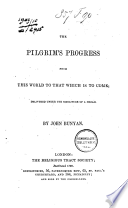
Part II, Ch. XIII <!-- Sect. 4 -->
The Pilgrim's Progress (1678), Part II
Context: Then Mr. Honest called for his friends, and said unto them, I die, but shall make no will. As for my honesty, it shall go with me; let him that comes after be told of this. When the day that he was to be gone was come, he addressed himself to go over the river. Now the river at that time over-flowed its banks in some places; but Mr. Honest, in his lifetime, had spoken to one Good-conscience to meet him there, the which he also did, and lent him his hand, and so helped him over. The last words of Mr. Honest were, Grace reigns! So he left the world.After this it was noised abroad that Mr. Valiant-for-truth was taken with a summons by the same post as the other, and had this for a token that the summons was true, "That his pitcher was broken at the fountain." When he understood it, he called for his friends, and told them of it. Then said he, I am going to my Father’s; and though with great difficulty I have got hither, yet now I do not repent me of all the trouble I have been at to arrive where I am. My sword I give to him that shall succeed me in my pilgrimage, and my courage and skill to him that can get it. My marks and scars I carry with me, to be a witness for me that I have fought His battles who will now be my rewarder. When the day that he must go hence was come, many accompanied him to the river-side, into which as he went, he said, "Death, where is thy sting?" And as he went down deeper, he said, "Grave, where is thy victory?"
So he passed over, and all the trumpets sounded for him on the other side.
